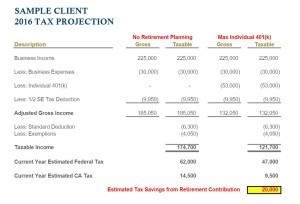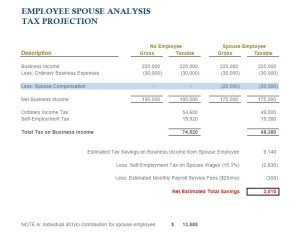9 Year End Tax Tips for Investors
Blake Street
Chartered Financial Analyst
Certified Financial Planner®
Founding Partner & CIO
Warren Street Wealth Advisors
I know, I know, you’d rather be thinking about the holidays than taxes. Consider us The Grinch for even bringing this up, however, the timing is important. As the years draws to a close it is important that you consider year end tax planning before 2017 strikes our calendars.
Here are the some of the biggest items for consideration for an investor before year end:
1) Changes to the tax code?
There were no significant changes to tax law from 2015 to 2016, prepare for much of the same for your 2016 filing.
2) Don’t forget your RMDs (Required Minimum Distribution)
If you’re over age 70 ½, make sure you take your required minimum distribution (RMD) by December 31st. Investors who turned 70 ½ this year can defer their 2016 RMD until April 1st of next year, but that will mean taking two RMDs next year. Investors who turned 70 ½ last year and deferred their 2015 RMD to 2016 need to make sure they take their 2016 RMD by December 31st. Important to note: RMDs apply to most retirement accounts, not just IRAs; 401(k)s and even Roth 401(k)s are subject to RMDs.
3) Max out your IRAs
If you are eligible, be sure to max out your IRA when you can. An individual can contribute up to $5,500 per year, or $6,500 if over the age of 50. These contributions can be on a tax deferred basis or after-tax basis (ROTH IRA) depending on your personal goals and objectives.
The truth is you can cut these checks all the way up until the time you file your taxes, but as like I to say to myself, “save early, save often.”
4) Consider a ROTH conversion
If you think you’re in a lower tax bracket now then you will be in the future, and you’ve got most your assets in pre-tax buckets like a 401(k) or an IRA, it may pay to consider converting some of those assets to a ROTH IRA. The ROTH IRA grows and can be withdrawn from tax free after age 59 ½. Converting assets to a ROTH may create a tax bill today for future savings, so be aware.
One wonderful perk of a conversion is the fact that you can undo it should the terms or tax implications look unfavorable before you file. This is called recharacterization. You’re eligible to recharacterize the conversion all the way up until the time you file, including extensions.
Consider converting small portions over a long period of time when your tax scenario makes sense.
5) Make the Most of your Charitable Giving
Charitable contributions are usually deductible up to 50% of your adjusted gross income (AGI). If you have a habit of being charitable, might as well get credit for the deduction. If you plan to give, consider doing it in years when you need the tax break. Also, if you’re at the limit for giving, consider delaying gifts until your deduct limit clears out next year.
One other strategy we like to see considered is gifting highly appreciated securities. You can deduct the market value of the securities subject to your deduction limit, and avoid the capital gains taxes you would have been exposed to should have sold the securities in your name.
If you’re curious for a ballpark figure on what you can deduct, you can see your AGI on Page 1, Box 37 of your 1040, also known as your tax return.
6) Consider Qualified Charitable Distributions
Two bullet points for charity, we can’t be The Grinch! Qualified Charitable Distributions (QCDs) are a wonderful part of the tax code that allows you take distributions from your IRA and send directly to a charity of your choice, tax free.
The best part, QCDs don’t count as income, but do count against your RMDs. QCDs will also reduce your adjusted gross income and could reduce your Medicare Part B premiums, in addition to reducing the amount of your Social Security benefits that are taxable.
7) Gifts to Non-charitable Interests
I know, sometimes your loved ones feel like charity, but if you’ve got any large gifts planned to grandkids, children, or whomever, timing matters. You’re able to gift $14,000 to any individual each year without any gift tax implications. You and your spouse can gift that amount separately to the same person for a total of $28,000.
These gift amounts are a great way to reduce your taxable estate or even fund your wishes in your lifetime without getting into messy gift and estate tax issues. One additional creative idea, you’re able to gift five years worth of gift limits into a 529 plan in a single year, so in this case, $70,000. One asterisk, you can’t gift to this person again for five years. We see folks use this technique if they want to fund large portions of someone’s advanced education while reducing their taxable estate at a faster rate.
8) Tax Loss Harvest
This is something we do on behalf of our clients, but if you manage outside assets on your own, consider booking some of your losses. We all have some, don’t be shy. Losses can be used to offset capital gains generated within your portfolio, carried forward to future years, or even a small portion used to reduce taxable income. One great idea when harvesting losses is trying to replicate your exposure of what you sold, so that you’re not sitting in cash waiting for the IRS 30-day wash sale rule to pass to buy back the original security. If it sounds complicated, let us show you how we do it for our clients.
9) Take Your Gains
To add some intrigue after the last bullet point, it’s equally as important to harvest your gains at the appropriate time. Depending on your income level, you could pay as low as 0% in long term capital gains tax rates. It makes sense to know in what years you’ll fall below this income threshold so that you can pay as little taxes as possible.
RMD? IRA? What are these things exactly? If you need help navigating your financial picture, contact us and schedule a free consultation.
Blake Street is a Founding Partner and Chief Investment Officer of Warren Street Wealth Advisors. Blake graduated from California State University, Fullerton in 2009 with a Bachelor of Arts in Finance, and he is a CERTIFIED FINANCIAL PLANNER™ (CFP™) and a Chartered Financial Analyst (CFA).
Disclosure: Blake Street is an Investment Advisor Representative of Warren Street Wealth Advisors, a Registered Investment Advisor. The information posted here represents his opinions and is not meant as personal or actionable advice to any individual, corporation, or other entity. Any investments discussed carry unique risks and should be carefully considered and reviewed by you and your financial professional. Nothing in this commentary is a solicitation to buy, or sell, any securities, or an attempt to furnish personal investment advice. We may hold securities referenced in the blog and due to the static nature of content, those securities held may change over time and trades may be contrary to outdated posts.



